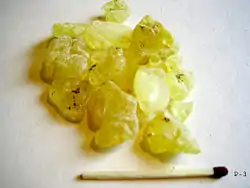mastic
English

Mastic tears
Etymology
From Middle English mastik, from Old French mastic, from Latin mastiche, from Ancient Greek μαστίχη (mastíkhē), from μαστιχάω (mastikháō, “I chew”) (note the chewing gum sense). Related to masticate. The broad sense for cements came via extension from predecessor cements made with the tree's resin.
Pronunciation
- IPA(key): /ˈmæstɪk/
- Rhymes: -æstɪk
Noun
mastic (countable and uncountable, plural mastics)
- An evergreen shrub or small tree, Pistacia lentiscus (mastic tree), native to the Mediterranean.
- 1745, Richard Pococke, A Description of the East, and Some other Countries, Volume II, Book I, Chapter 1:
- The island of Scio is now called by the Greeks Kio [Χιο], the antient Greek name of it was Chios [Χιος]; it was first called Ætalia in very antient times, and also Mastic, on account of the great number of mastic trees that were in this island.
- A hard, brittle, aromatic and transparent resin produced by this tree and used to make varnishes and chewing gum, and as a flavouring.
- Synonym: tears of Chios
- 1799, John Montagu, 4th Earl of Sandwich, Voyage Performed by the Late Earl of Sandwich Round the Mediterranean in the Years 1738 and 1739, Written by Himself, pages 317–318:
- The mastic, of which the people of Scio gather every year an incredible quantity, is a very rich gum, made use of in medicines, which distils from a shrub called, in Latin, Lentiscus.
- 1830, Thomas Moore, Letters and Journals of Lord Byron: with Notices of his Life, volume I, New York: J. & J. Harper, page 402:
- Having taken upon me to order the repast, and knowing that Lord Byron, for the last two days, had done nothing towards sustenance, beyond eating a few biscuits and (to appease appetite) chewing mastic, I desired that we should have a good supply of, at least, two kinds of fish.
- 1834, James Augustus St. John, Egypt and Mohammed Ali, or Travels in the Valley of the Nile, London: Longman, Rees, Orme, Brown, Green & Longman, Volume I, Chapter 132, pp. 322-323,
- […] in many harems, the women are in the habit of burning mastic on a small chaffing-dish, and holding the mouth of the jars over the smoke; by which means they communicate to them a scent which perfumes the water for eight or ten days, at the expiration of which the operation must be repeated.
- 1936, Rollo Ahmed, The Black Art, London: Long, page 112:
- Aromatics were used, too, especially in necromancy, and an old recipe of that sort comprises Musk, Myrrh, Frankincense, Red Storax, Mastick, Olibanum, Saffron, Benzoin and Labdanum.
- An alcoholic liquor flavoured with this resin.
- 1913, Marjorie Bowen, A Knight of Spain, Part II, Chapter 6:
- He took a list from the desk and read aloud Fatima’s offerings:— […] four bottles of rare mastic from Scio.
- (especially Commonwealth English) Any of various cements, usually flexible and waterproof, used as an adhesive, sealant, caulk, or filler.
- 1961, V. S. Naipaul, A House for Mr Biswas, Vintage International, published 2001, Part One, Chapter 5:
- ‘They have a few holes here and there. A few. Tiny tiny.’ ‘We could fix those up easy. Mastic cement. Not expensive, boss.’
Derived terms
Translations
the shrub or tree Pistacia lentiscus
|
the tree's resin
|
See also
- Mastichochoria
- (vaguely specified filler): Polyfilla
Further reading
 Mastic (plant resin) on Wikipedia.Wikipedia
Mastic (plant resin) on Wikipedia.Wikipedia  Mastic on Wikipedia.Wikipedia
Mastic on Wikipedia.Wikipedia
Middle English
Romanian
Declension
Declension of mastic
This article is issued from Wiktionary. The text is licensed under Creative Commons - Attribution - Sharealike. Additional terms may apply for the media files.